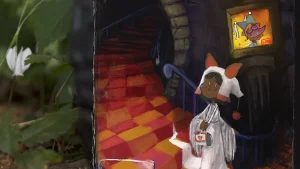Cheating: Pandemic side effect?

A student using their resources to cheat on a test.
Picture this: You’re sitting in your bedroom taking your U.S. History quiz. You looked over your notes last night and feel super confident going into the test. Leaving your camera on your face in the Zoom call, you open up the Google Form that the test is on. You breeze through the first couple questions, and then you freeze. “When the heck was the Boston Tea Party?” you wonder. Sure, you knew all about the event, but you forget the exact date. What do you do? Your notes are sitting very close to you, and you know for sure that the answer is written on them. Do you remain honest and take your best guess? Do you exit the Zoom due to “connection issues” and dig through your notes? Do you sneakily take a look at your notes when your camera is still on? Do you use your phone or other computer, due to the locked screen, to look up the answer? Or do you text your friend, who has already taken the test, for the answers as a screen shot?
In these days of online learning, it’s very easy to cheat. All it takes is a little click to search Google, send a text, or to quickly turn off your camera. Maybe some teachers don’t realize that students are cheating, and even if they do, there’s not always a way to prove it, but cheating is happening. Because of online learning, many students are taking advantage of being online and searching up “When was the Boston Tea Party?” in order to get good grades this year.
So, why do students want to cheat? What causes them to want to do something that we’ve been taught is wrong? According to Chris Loschiavo, students might feel the urge to cheat because “It can be an intentional, calculated decision in order to get ahead. Often, it is motivated by the path to success that they see around them – people cheating without incurring any real consequences.” This urge to cheat can be accentuated by pressure. Loschiavo states “When they believe they are going to fail (which nowadays is often anything less than an “A”), students will do whatever it takes to avoid failure, because they don’t want to let others (often family) down.” Has this pressure to stay ahead been heightened by the pandemic or are students even able to focus on school during online learning this year?
I sent out an anonymous survey to my classmates about cheating to find out if students felt this pressure to succeed. As expected, students are cheating – some students cheat all the time! And, yes, some feel pressure to get good grades. When responding to my open-ended question about what cheating meant to the participants, one anonymous student said that cheating was “an easier way to pass and get good grades.” Another commented that “It means nothing. School is just to pass and graduate, if I need to graduate what does it matter how I did it? Cheating and not cheating both end at the same place, so why bother in not cheating if you need it to keep your grades up?” Most suggested they weren’t cheating; they were just using their resources because they “couldn’t stand to see a bad grade”. However, other students argued that grades don’t reflect the student’s performance. One student wrote that “A grade doesn’t necessarily reflect a student’s work ethic, in my opinion, and life happens. People get busy, and sometimes forget they have a quiz the next day. I don’t think cheating should be constantly done in large quantities, but I don’t really think it hurts to do it sometimes.” My survey did find that students have the urge to succeed and feel the pressure for good grades, but when looking at the results, it seems that the students were only focusing on the here and now, living day by day, as we are all in this pandemic, and not really thinking about how this cheating will affect them in the future.
Sarah Campbell, a ninth grader, said that “Cheating means something a little different to me this year. All of us (students and teachers alike) have had to adjust to the difficult times 2020 has brought us.” This is very true! Many teachers have had to adjust their plans to fit this new virtual environment, and some students might find it hard to concentrate and understand the material while staring at their computer screen for eight hours a day. Campbell also said that “I feel if important things are missed, especially a whole class, and a test rolls around, teachers should have a little bit of leniency. Kids at home have an unfair advantage to kids who are participating in tests at school. It may hinder the students at home learning, but the kids who choose not to cheat or can’t cheat because they are in school will not be able to be given fair acknowledgment of their accomplishments.” Because of this, the grades this year will not show which students are hardworking, honest, and dedicated.
I needed to hear a teacher’s point of view. Mr. Peterson, a geometry teacher, said: “I’ll get the obvious out of the way and say that cheating shows a lack of integrity, defeats the learning purpose, and there is no exception due to COVID.” He also commented that “There is truly nothing we as teachers can do to prevent it, although there are ways we can detect it.” He also commented that “My philosophy remains the same: If you cheat at high school, you’re probably going to have a hard time with the rest of life!” He has looked at the bigger picture, that students are only trying to get through the day and aren’t looking at the future.
Another teacher, Mr. Dunne, had similar views. He wrote that, “ I think cheating says a lot about someone’s character and their integrity. It’s always important to put forth your best effort and to be true to yourself.” However, cheating isn’t going away – it’s still going to be present, in all different schools across the globe. “Students are always going to look for something that will give them an advantage. However, the way students can cheat has changed over the years with the advancements in technology and from working in a virtual setting. It’s not just sharing an old fashioned note with the answers; now it’s sharing screenshots of everything.” He explained that by knowing someone’s friend groups, he could tell when they were cheating if they had similar answers on an assignment. “It’s harder to catch cheating this year, especially with the Google form quizzes. I can turn on locked mode, but I can’t always tell if a student at home is looking at their phone or another laptop”, he said. “I also want students to know that cheating can come back and hurt them in the long run.”
Ms. Levengood, a Spanish teacher, had issues with cheating even when the coronavirus pandemic wasn’t present because of Google Translate. She says that “Taking shortcuts does not give the learner the opportunity to build a strong base- which is absolutely necessary to learning a language.” To fix this dilemma, she says that she has been “trying to give more open- note evaluations so kids can show me what they know and reward them for staying current with our class notes. I would rather they process their own materials to create responses, but open- note isn’t always appropriate.” Are open notes quizzes a better solution? Peyton Carley sides with this issue by saying “Most high school tests don’t allow any sort of notes to be used on whatever test you take. But I never understood this because when you get in the real world, is your boss ever going to ask you, “Hey you need to fill out those expense reports, but you can’t use any spreadsheets or data from the company over the past fiscal year.” The answer is no. Why is the answer no? Well simply because the boss in this situation wants you to do the best you can on those expense reports so that you and your boss don’t get in trouble.” Students are going to have their notes (and phone) in the real world, so why are we prohibited from using them now? Using our notes might be the best solution to benefit all students. Plus, even with your notes, you do need an understanding of the topic to succeed, so it won’t be an “easy A.” You actually need to understand what’s going on, or your notes will seem like another language.
On the flip side, some even tell us that cheating is a good thing. Cevin Soling writes that “Cheating often requires creativity in terms of execution as well as ingenuity to avoid being caught.” Students need imagination and a problem-solving mind in order to cheat, and when they succeed, they feel good that they have accomplished such a difficult task! He also writes that “cheating should be recognized as the necessary and logical outcome of an arbitrary and oppressive institution.” Yes, cheating without getting caught may take problem solving skills and creativity, but wouldn’t time be better spent asking your teacher for a different explanation of the topic or completing a few more practice problems? And, yes, memorizing certain facts that students will never be able to retain past this year does seem arbitrary and oppressive, but how can educators really quantify learning? I feel that the answer just can’t be simply cheating is wrong or right. The real question that needs to be answered is why do students need to cheat? Are they not understanding? Do they not have a love of learning? Are they not engaged in school? Is the school format the complete opposite of how the rest of our attention is lassoed? Are there changes required to gamify education? And most importantly, is there a system in place to learn from our mistakes, especially during these socially distant Google forms, or are we all just checking off the boxes of curriculum this year?
In conclusion, cheating by using knowledge other than your own, is a complex topic. As we continue on this incredible journey of online learning during the coronavirus pandemic, we need to remember that these times are stressful, for both teachers and students. Not all teachers and students are thriving in this new environment. Maybe it’s time to change our educational norms from memorizing facts and figures and doing busy work into something new that keeps student’s attention! Maybe an open note test is the only way to ensure a level playing field, and to look beyond mere memorization and more into understanding of the larger picture. There is a wealth of opinions on cheating found on the internet. Amy Morin posted 10 reasons as to why teens shouldn’t cheat, which include that “cheating is self-degrading” and “cheating kills trust.” Ever since we stepped into elementary school, we’ve been taught that cheating is wrong and disrespectful, and it hurts yourself and others. Cheating truly does limit your future, and blocks you from reaching your fullest potential. So let’s make a sincere effort for 2021 on our job, as students, to take every advantage to learn as much as we can. Even though some of our role models seem to take the easy way out, we need to learn from our mistakes and ask questions if we don’t understand and just remember that “Who questions much, shall gain much, and retains much.” -Francis Bacon
MaryAnn is a sophomore this year, and this is her second year writing for the CUB. She's always looking for an interesting or strange event to tell...

















